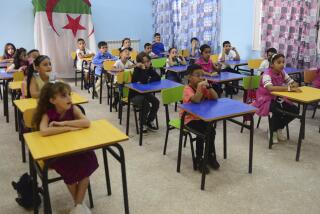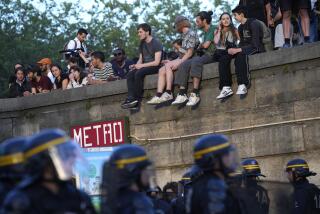France Finds a Model in America
- Share via
PARIS — When 563 high school students in the Montparnasse quarter of Paris trudge back through the arched doors of the Lycee Paul Bert next month, things will not be as they left them.
Most likely, there will still be large red strokes of graffiti scrawled on the school’s red-and-white stone facade. And at the entrance, two flags--the red, white and blue of France and the bright yellow stars on blue of the European Union--will continue to flap in the breeze.
But inside, students will discover that they are spending fewer hours scribbling at the plain wooden desks lined up in military-style rows, and more time in smaller groups with teachers or in the library studying alone.
Traditionally, children in France have endured one of the most rigid educational systems in the world. There are no art projects, science fairs or school plays. There is little emphasis on discussion or creative projects. Instead, the focus is on memorizing dates and other facts.
And in this, many French take great pride, saying the high level of work expected of their sons and daughters makes France unique.
Into this world has stepped Education Minister Claude Allegre, a renowned specialist in earth sciences and astronomy who is unabashed in his affection for things American--an attitude that angers many in France. He has taught at the Massachusetts Institute of Technology and credits U.S. schools with stimulating innovation by granting students the freedom to think.
Current French-style education, he says, stifles the creativity and research found in the United States.
If Allegre has his way, the traditional system will be abandoned in favor of what one of his advisors calls a novel approach “very much in accordance with Anglo-Saxon traditions”--one that bears similarities to progressive American education.
With the nationwide reforms in lycees, or high schools, beginning in September, the Socialist-led government hopes to reduce the pressure on students and to teach them to tackle academic problems on their own.
“We hope they will learn better. They learn more, but badly, today. Learning dates is not important,” says Marie-Carmen Dupuy, secretary general of the Federation of Parents of Public School Students. “What is important is that they know where to find information and how to use it.”
But any tampering with the educational system, even the most modest, provokes an uproar in France. This is what Allegre found after he took office in June 1997, vowing to make sweeping changes. Last year, students and teachers alike took up placards to protest everything from the slashing of hours spent in lessons to the minister’s attitude. Allegre was forced to back down--albeit not far.
Preparation for the French high school diploma, or baccalaureat, is intimidating in the amount of work it demands. Students in public lycees often take more courses than their American counterparts. At the Lycee Paul Bert, for example, sophomores and juniors study seven or eight subjects each year--French, math, two sciences, history, geography, physical education and sometimes economics. As seniors, they are also expected to take philosophy--a course usually reserved for college in the U.S.
French students spend more time than their foreign counterparts listening to teachers lecture--more than five hours a day.
Easing the Course Load
Allegre’s reforms constitute an important part of the minister’s push to, as he put it recently, modernize the French system of teaching and research so it “contributes to economic development and to our competitive abilities on an international scale.”
To that end, Allegre wants to lighten the course load and move the learning environment outside the structured classroom.
Government officials and the 62-year-old minister’s supporters say French schools must adapt to educate students of all means and academic levels, not just the most talented--a shift in philosophy that they hope will revolutionize French education.
But many in the teaching profession disagree.
“We don’t need a revolution,” says Denis Paget, secretary general of the National Syndicate for Secondary School Teachers, one of France’s largest teachers unions. “We don’t need Rambo in our national education system.” Instead, says Paget, what French schools require are more teachers.
In the eyes of the union, Allegre’s vaunted campaign of modernization will rob France’s most gifted and hard-working children of time and attention and “dumb down” public education. The status quo, Paget maintains, “is not too much or too hard [on students]. It’s just demanding.”
Some say that Allegre’s blunt approach has created more problems than his actual ideas for reform. “It’s not easy to talk to him. We have a minister who has trouble listening,” contends Laurent Brisset, national secretary of the National Federation for Education, another union of teachers and school administrators.
But early on, Allegre did bring into the process some of the people who would be most affected, having an advisor meet in the spring of 1998 with teachers and students to brainstorm and flesh out ideas. A final agenda for reform was debated in Parliament and presented to the nation in March.
But many mysteries remain. Administrators such as Yves Le Guen, dean of academics at the Lycee Paul Bert, have not yet received concrete directions on how to organize the new school year, which will begin in less than a month. Changes, however, will be gradual at first.
“The life of a high school student is not going to change fundamentally,” Le Guen says.
The reforms will begin with the high school class due to graduate in 2002. Teachers will hold extra-help sessions, in small groups of no more than eight students, to go over what has been taught in class. To make time for those reviews, class time will be cut by two hours each week. Students who don’t need extra help will spend those two hours in the library or at home. For critics like Paget, this is evidence that Allegre’s changes take time from the more talented.
For students of all levels, there will be more classroom work in small groups. Graduate students will serve as teachers’ aides, because France’s government doesn’t have the money to hire new teachers, admits Allegre advisor Philippe Meirieu, director of the National Institute for Pedagogical Research.
Teachers are now expected to communicate more with students and with each other and to encourage more interdisciplinary work. From a nationally approved list, lycee students will pick a topic and collaborate with several teachers to produce an in-depth report.
Finally, Allegre’s ministry is establishing a new high school subject--the study of civics and democracy. History and geography teachers will try to instill in students a greater understanding of their duties as citizens and some of the issues that confront contemporary France: racism, unemployment, challenges of a more globalized economy.
For two hours each month, students will engage in debates, instead of dutifully copying down their teacher’s words.
“It opens up the possibility for students to find within the school what before they could only find elsewhere at a price,” Meirieu says of the reforms, and the extra instruction they offer to less-than-stellar performers.
The changes are expected to ease the burden on parents, who now may struggle trying to explain Boolean sets or Latin verbs to their confused offspring.
“For us, it’s the role of the school to help the students,” says Dupuy of the parents federation. “Parents have another role.”
A Question of Money
But to many, the umpteenth reform of public education in France seems incomplete. Allegre’s ministry won’t release cost figures, but according to one well-informed source, there will be no more than $15 million in public money to pay for the changes over the next three years. And cutting a few hours out of classroom study is scarcely sufficient to alter the way young minds think.
“Students in the schools have changed, but they are still good-quality schools,” Paget says. Throughout the ‘90s, the union leader says, French teachers have been adapting to the new needs of students, classroom by classroom.
According to Allegre, whose mother was an elementary school teacher, much more needs to be done.
“Allegre said when he arrived, ‘I’m going to make a revolution,’ ” says journalist Paul Quinio, who specializes in education.
The minister’s ability to revolutionize the system may depend on how much support he can garner from the country’s teachers and students.
More to Read
Sign up for Essential California
The most important California stories and recommendations in your inbox every morning.
You may occasionally receive promotional content from the Los Angeles Times.













